De Schotse schrijver Irvine Welsh werd geboren op 27 september 1958 in Leith, Edinburgh. Zie ook mijn blog van 27 september 2010 en eveneens alle tags voor Irvine Welsh op dit blog.
Uit: Filth
“We wait and think and doubt and hate. How does it make you feel? The overwhelming feeling is rage. We hate ourself for being unable to be other than what we are. Unable to be better. We feel rage. The feelings must be followed. It doesn’t matter whether you’re an ideologue or a sensualist, you follow the stimuli thinking that they’re your signposts to the promised land. But they are nothing of the kind. What they are is rocks to navigate the past, each on your brush against, ripping you a little more open and they are always more on the horizon. But you can’t face up to the that, so you force yourself to believe the bullshit of those you instinctively know are liars and you repeat those lies to yourself and to others, hoping that by repeating them often and fervently enough you’ll attain the godlike status we accord those who tell the lies most frequently and most passionately. But you never do, and even if you could, you wouldn’t value it, you’d realise that nobody believes in heroes any more. We know that they only want to sell us something we don’t really want and keep from us what we really do need. Maybe that’s a good thing. Maybe we’re getting in touch with our condition at last. It’s horrible how we always die alone, but no worse than living alone.”
(…)
“All I can think about is that boy’s skull, bashed in, the way his head was caved in and how it wasn’t like a heid at all, just like a broken silly puppet face, about how when you destroy something, when you brutalise it, it always looks warped and disfigured and slightly unreal and unhuman and that’s what makes it easier for you to go on brutalising it, go on fucking it and hurting it and mashing until you’ve destroyed it completely, proving that destruction is natural in the human spirit, that nature has devices to enable us to destroy, to make it easier for us; a way of making righteous people who want to act do things without the fear of consequence, a way of making us less than human, as we break the laws . .”

Irvine Welsh (Edinburg, 27 september 1958)
De Amerikaanse dichteres Kay Ryan werd geboren op 27september 1945 in San Jose, California. Zie ook mijn blog van 27 september 2010 en eveneens alle tags voor Kay Ryan op dit blog.
Spiderweb
From other
angles the
fibers look
fragile, but
not from the
spider’s, always
hauling coarse
ropes, hitching
lines to the
best posts
possible. It’s
heavy work
everyplace,
fighting sag,
winching up
give. It
isn’t ever
delicate
to live.
Age
As some people age
they kinden.
The apertures
of their eyes widen.
I do not think they weaken;
I think something weak strengthens
until they are more and more it,
like letting in heaven.
But other people are
mussels or clams, frightened.
Steam or knife blades mean open.
They hear heaven, they think boiled or broken.
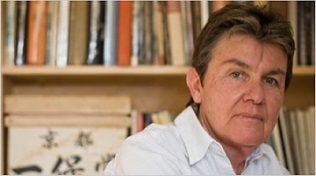
Kay Ryan (San Jose, 27 september 1945)
De Nederlandse dichter, schrijver, kunstenaar en huisarts Ignace Schretlen werd geboren in Tilburg op 27 september 1952. Zie eveneens alle tags voor Ignace Schretlen op dit blog.
Van wiegelied tot buggytaal
Van wiegelied tot buggytaal leerde ik je spreken maar
’t mooiste woord wat ik je gaf is wel jouw naam geweest
geen lege kamer werd zo met zorg gepoetst en onderhouden
keer op keer van roestplekken ontdaan en telkens weer
zo behoedzaam betreden als ooit fluisterend de eerste maal
geen woord sprak ik zo vaak uit zonder te herhalen
taal reikt niet verder dan het voorwoord van hetgeen ik je
te zeggen heb maar luister naar de rijkdom van haar klanken
zo moet ook ooit jouw naam geboren zijn, als geritsel in
een boom dat niet verstaan maar wel begrepen wordt
nooit liet ik je onbeheerd maar nu de avond valt lost
mijn verweerde huid van steen zich langzaam op
kijk vanuit de verte hoe ik jou stralen laat, sluit niet
eerder de luiken dan eer het licht helemaal is gedoofd.
De troost van vanillevla
Voor Vivienne
Ontroostbaar omdat de ‘H’ in schoonschrift jou niet lukken wil
zoals mijn woorden zich niet altijd schikken laten in een gedicht
de ‘H’ – zegt jouw juf – is een kleine ‘L’ na een grote ‘i’
zo simpel denken mensen ook over vanzelflopende poëzie
kun jij met zo’n slinger-‘H’ mooie grote woorden schrijven;
kan ik met mooie grote woorden mensen troosten bij verdriet
je huilt, ik twijfel…maar thuis wacht ons allebei vanillevla.
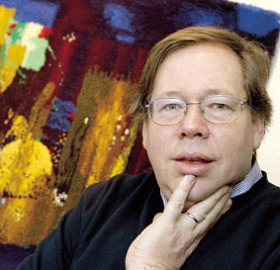
Ignace Schretlen (Tilburg, 27 september 1952)
De Tsjechische schrijver en uitgever Josef Škvorecký werd geboren op 27 september 1924 in Náchod. Zie ook mijn blog van 27 september 2010 en eveneens alle tags voor Josef Škvorecký op dit blog.
Uit: The Bass Saxophone (Vertaald door Kaca Polackova-Henley)
“I had committed a crime; it seems unbelievable today what could (can) be a crime: a Beatles haircut in Indonesia (that’s today, and that kind of power is always a festering effusion of weakness) – our ducktail haircuts were also once a crime just like the locks on the heads of youths that shock syphilitic waiters so much today; and the fact that my father had been seen conversing with Mr. Kollitschoner; and the conviction that Drosophila flies are suitable for biological experiments; the use of slang; a joke about the president’s wife; faith in the miraculous power of paintings and statues; a lack of faith in the miraculous power of paintings and statues; and everywhere the eyes, the spying eyes of the Kanas and the Vladykas; and the ears; and the little reports; and the file cards, keypunched, cybernetic, apparently the first things of all to be cyberneticized. I used to draw advertising slides for the movie house; I would carry them down the iron ladder to the projection booth and because beauty-inspired joy, pleasure-inspired pleasure is diminished by solitude, it had occurred to me: I had those rare records at home, I always used to listen to them before I went to sleep, on an old wind-up phonograph next to my bed: “Doctor Blues,” “St. James Infirmary,” “Blues in the Night,” “Sweet Sue,” the Boswell Sisters, “Mood Indigo,” “Jump, Jack, Jump”; and so one day in the projection booth when the electric phonograph was spinning and amplifying a native polka called “Hey, Ma, Who Are You Saving Your Daughter For?” the idea had possessed me: I made my decision. In spite of the fact that they were so rare, I had brought them to the booth (I had labeled the vocal pieces with paper tape so Mack wouldn’t make a mistake and put one on by accident) and while Herr Regierungskommissar and the others were awaiting the beginning of the film “Quax, der Bruchpilot,” I was awaiting the first beats of Webb’s drum in the foxtrot “Congo” -the annunciation, the sending down of beauty on the heads in the movie house; and when it finally came, that bliss, that splendor, I looked down through the little window and I couldn’t understand why no heads were turned, no eyes opened in amazement, that they were not suddenly quiet and that the jaws cracking wartime sour candy did not pause in their effort; the crowd murmured on in their trite crowd conversation; and then, that once, Mack made a mistake (he explained later that the label had come unstuck on that side of the record); the crowd murmured on, ignoring the smeared swinging of Chick’s saxes, and murmured on when Ella came in with her nasal twang (“I’ve got a guy, and he’s tough. He’s just a gem in the rough. But when I polish him up, I swear . . .”); only Horst Hermann Kühl stopped talking, pricked up his ears, took notice, and then cut loose with a roar (hate is unfortunately always much more observant than love, and more observant even than an insufficiency of love).
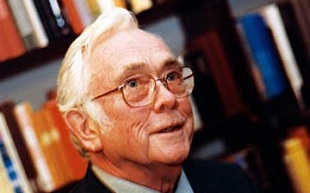
Josef Škvorecký (Náchod, 27 september 1924)
De Nederlandse schrijfster Esther Verhoef-Verhallen werd geboren in ’s-Hertogenbosch op 27 september 1968. Zie ook mijn blog van 27 september 2010 en eveneens alle tags voor Esther Verhoef op dit blog.
Uit: Muren van glas
„Het is acht uur in de ochtend. Mijn hoofd bonkt, mijn lijf voelt zwaar. Mijn oogleden willen alleen maar dichtvallen. Ik had voor vertrek meer koffie moeten drinken; die dubbele espresso was niet genoeg. Dat krijg je ervan als je de halve nacht doorwerkt en er om zes uur weer uit moet.
Tot overmaat van ramp zitten Dennis en ik vast in een file die maar niet wil oplossen. Er heeft zich zojuist een ambulance tussen de auto’s door gewurmd. Daarna volgden twee politiewagens. Even verderop moet een ongeluk zijn gebeurd. Ik hoop toch echt dat het niet kilometers verderop is, want dan staan we hier over een halfuur nog. Ik kijk om me heen. Vier banen breed staat het verkeer vast. Iedereen kijkt chagrijnig voor zich uit. Voor ons, achter ons, naast ons. En het regent ook nog. Dit is nou typisch zo’n ochtend waar ik een hekel aan heb: een naargeestige, sombere Hollandse novembermorgen. Ik verlang naar zon, palmbomen en een blauwe zee. Dan zit ik hier verkeerd: om ons heen alleen asfalt, beton, glas en ijzer.
‘Hoe laat moeten we er uiterlijk zijn?’ vraag ik aan Dennis.
Mijn knappe, blonde beste vriend en collega zit naast me op zijn nagels te bijten. Zijn sneakers rusten op het dashboard van ons vrachtwagentje. Hoewel, rusten… de rode All Stars wiebelen continu heen en weer. De zolen piepen op het verweerde plastic. Dennis kan slecht tegen stress. Ik niet beter, trouwens, maar je ziet het aan mij minder.
‘Halfnegen moet alles zijn afgeleverd,’ antwoordt hij. ‘De beurs gaat om halftien open voor publiek.“
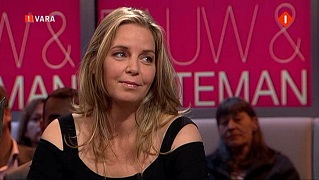
Esther Verhoef (‘s-Hertogenbosch, 27 september 1968)
De Duitse dichter en schrijver Christian Schloyer werd geboren op 27 september 1976 in Erlangen. Zie ook mijn blog van 27 september 2010 en eveneens alle tags voor Christian Schloyer op dit blog.
walnüsse knacken
geduldig warten in japan
an ampeln die aaskräh’n – drehst dich im schlaf
auf die seite · legen in japan krähen
nüsse auf straßen – du träumst in zwei sprachen
fern warten die krähen scheint’s auf ein
knacken · (als wären sie fähig, das rot aus
ampeln zu saufen, als wüssten sie wie man
schatten aus kirschblüten stiehlt) + zähl’n die rippen
bei grün · lesen sie zeilen · aus deinem rücken
superman im september
sonneneinfallskorridore zwischen platten
bauten, relais für das blecherne echo der straßen
baumaschinen unter metall
blauem
himmel; der wächst
mir übern kopf
mittags
schließt sich die fontanelle: das innen
echo der welt
ohne fluchtpunkt
dann ist das herbstblau zwischen den bäumen
denkbar am größten & der welt
raum – muss ein paar stunden
ohne mich auskommen
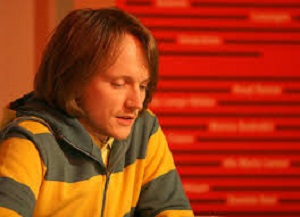
Christian Schloyer (Erlangen, 27 september 1976)
Zie voor nog meer schrijvers van de 27e september ook mijn blog van 27 september 2011 deel 2 en eveneens deel 3.
